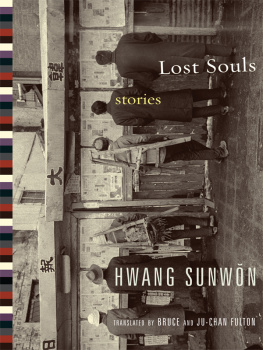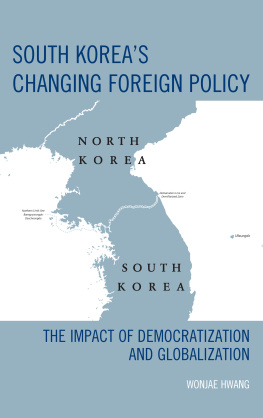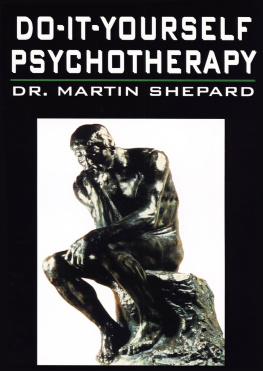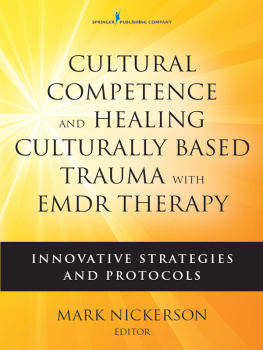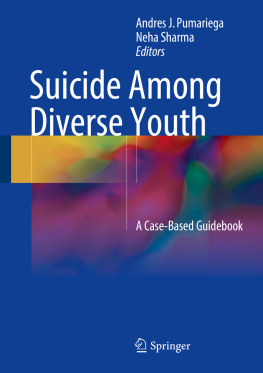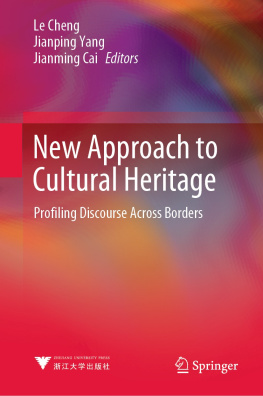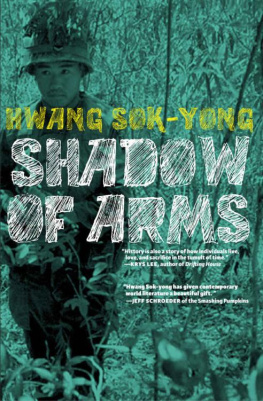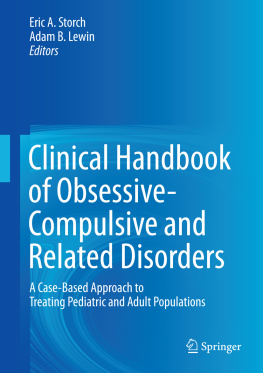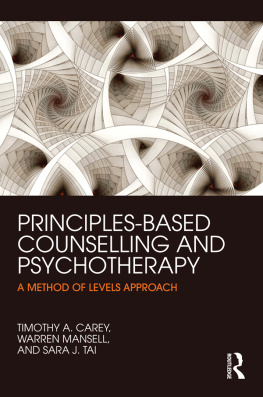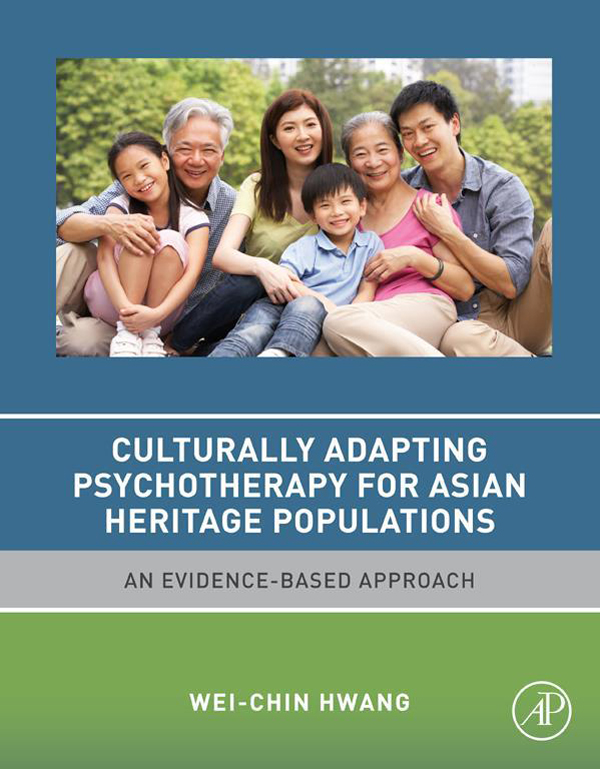Table of Contents
List of illustrations
- Figures in Chapter 3
Landmarks
Table of Contents
Culturally Adapting Psychotherapy for Asian Heritage Populations
An Evidence-Based Approach
Wei-chin Hwang
Claremont McKenna College, Claremont, CA, United States
Independent Clinical Psychological Practice, Pasadena and Claremont, CA, United States

Copyright
Academic Press is an imprint of Elsevier
125 London Wall, London EC2Y 5AS, UK
525 B Street, Suite 1800, San Diego, CA 92101-4495, USA
50 Hampshire Street, 5th Floor, Cambridge, MA 02139, USA
The Boulevard, Langford Lane, Kidlington, Oxford OX5 1GB, UK
Copyright 2016 Elsevier Inc. All rights reserved.
No part of this publication may be reproduced or transmitted in any form or by any means, electronic or mechanical, including photocopying, recording, or any information storage and retrieval system, without permission in writing from the publisher. Details on how to seek permission, further information about the Publishers permissions policies and our arrangements with organizations such as the Copyright Clearance Center and the Copyright Licensing Agency, can be found at our website: www.elsevier.com/permissions.
This book and the individual contributions contained in it are protected under copyright by the Publisher (other than as may be noted herein).
Notices
Knowledge and best practice in this field are constantly changing. As new research and experience broaden our understanding, changes in research methods, professional practices, or medical treatment may become necessary.
Practitioners and researchers must always rely on their own experience and knowledge in evaluating and using any information, methods, compounds, or experiments described herein. In using such information or methods they should be mindful of their own safety and the safety of others, including parties for whom they have a professional responsibility.
To the fullest extent of the law, neither the Publisher nor the authors, contributors, or editors, assume any liability for any injury and/or damage to persons or property as a matter of products liability, negligence or otherwise, or from any use or operation of any methods, products, instructions, or ideas contained in the material herein.
British Library Cataloguing-in-Publication Data
A catalogue record for this book is available from the British Library.
Library of Congress Cataloging-in-Publication Data
A catalog record for this book is available from the Library of Congress.
ISBN: 978-0-12-810404-0
For Information on all Academic Press publications visit our website at http://elsevier.com/

Publisher: Nikki Levy
Acquisition Editor: Nikki Levy
Editorial Project Manager: Barbara Makinster
Production Project Manager: Nicky Carter
Designer: Maria Ins Cruz
Typeset by MPS Limited, Chennai, India
Preface
This book is about culturally adapting psychotherapy and learning how to individualize therapy for diverse populations. In covering this topic, a primary focus of this book is placed on developing a broad and comprehensive understanding of how to culturally adapt psychotherapy for diverse populations, immigrants, and ethnic minorities. Many of the models, frameworks, and principles that I will discuss will be broad enough that they can be readily applied and will have general clinical utility with many different groups. However, the central focus of this book will be on developing a deep structural understanding of how to culturally adapt psychotherapy for Asian heritage populations. The goals are to help practitioners, researchers, and scientist-practitioners alike develop an intuitive understanding of cultural adaptations both broadly and deeply.
There are many books out there that discuss culturally competent treatment for diverse populations, and that provide separate chapters covering different racial or ethnocultural groups. Although this can be advantageous because it allows for breadth of understanding, they often leave readers with a superficial or stereotyped understanding of how to work with specific populations. Practitioners who want and need cultural competency are often left wondering what to actually do and what to say when they are working with diverse populations in the therapy room. They are often unsure of how to utilize the general or stereotyped information provided in a concrete and specific manner.
This book is different because the central focus is on providing practical, concrete, and clinically useful strategies that will help practitioners improve their clinical-cultural skills. The books emphasis is on culturally adapting psychotherapy for Asian heritage populations, a racial group consisting of many different ethnicities and national origins. It is important to note that there are many similarities across Asian groups, as well as many differences. A lesser focus is placed on understanding each and every one of these different Asian groups, while a greater focus is placed on understanding some of the similarities that cut across Asian heritage populations. A culturally competent therapist is a person who not only possesses concrete and specific knowledge about different cultural groups, but also understands how to think critically about the complex interplay of cultural and clinical issues. Specifically, they are able to take generic or stereotyped information, understand the broader context, while still being able to individualize therapy for the client. A culturally competent therapist is also able to process information and utilize a flexible mindset and framework to improve their ability to engage clients, improve therapeutic relationships, and be clinically effective. They are also cognizant to their own cultural biases, and possess a certain level of cultural self-awareness.
This book is also different from other books in that it provides the reader with an evidence-based and culturally adapted treatment manual that has been tested in a randomized controlled trial (RCT). As part of this book, the reader is provided with a culturally adapted and evidence-based 12-session treatment manual that was specifically developed for treating depressed Chinese Americans. This manual was developed using a community-participatory approach and tested in a clinical trial in San Francisco and Los Angeles. This RCT was funded by a R34 grant that I received from the National Institute of Mental Health (From Intervention Development to Services: Exploratory Research Grants) entitled Adapting Cognitive Behavioral Therapy (CBT) for Chinese Americans, which tested the Culturally Adapted CBT (CA-CBT) with CBT. It is important to note that even though the manual is a cultural adaptation of CBT, many of the cultural adaptations and therapeutic interventions utilized are not restricted to CBT. Specifically, when developing the cultural adaptations, I tried to develop cultural adaptations and modifications that would be effective, and that can cut across and be readily utilized when providing treatments of different therapeutic orientations and modalities.


